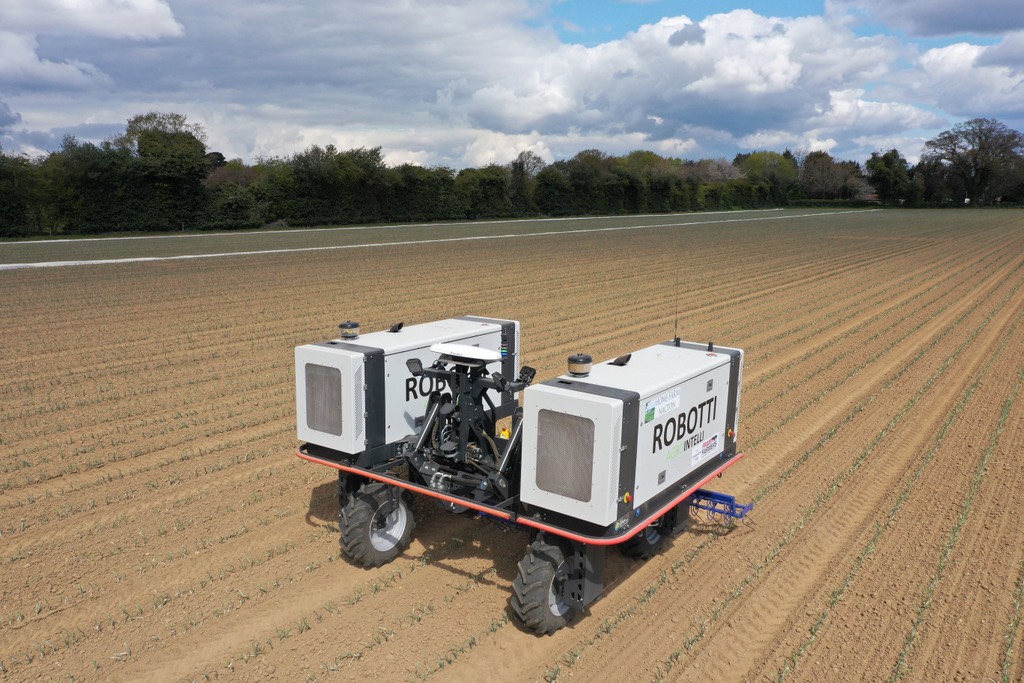In our ongoing exploration of the future of agriculture, this post follows up on our initial blog, “Pioneering the Future of Agriculture.” We are diving deeper into how cutting-edge Agri-tech solutions are shaping the agricultural landscape. This is the first in a series that will examine different aspects of agriculture’s future, starting with a case study on integrating farm automation into organic farming practices.
Recently, Andrew Francis and Tom Howe of Home Farm Nacton, a forward-thinking organic farm in Suffolk, shared their experiences with two revolutionary automation vehicles: the Robotti and the Farm Droid. These machines have brought both advantages and challenges, highlighting the complexities of integrating technology into traditional farming practices.
The Robotti: A Bold Leap into the Future
The Robotti, one of the first autonomous tractors introduced in the UK, was brought in to address a pressing issue: the shortage of seasonal labour due to Brexit. For an organic farm that relies heavily on manual labour for tasks like weeding, automating these processes was highly appealing. However, the Robotti’s performance has been a mixed experience.
Pros:
- Labour Reduction: The Robotti has significantly reduced the need for manual labour, particularly in tasks like weeding, helping mitigate the labour shortages that have become increasingly challenging post-Brexit.
- Precision Farming: The Robotti operates with GPS guidance, ensuring tasks such as cultivating and de-stoning are completed with high precision, particularly benefiting crops like potatoes where uniformity is key.
Cons:
- Operational Challenges: Despite its precision, the Robotti has faced significant issues with terrain adaptability. For instance, when working in potato beds, it often struggles with getting stuck in ridges and requires manual intervention.
- Time-Consuming Setup: Implementing the Robotti has required significant setup time and coordination with existing farm equipment. Adjusting GPS coordinates for tasks like de-stoning has proven to be a time-intensive process reducing its overall efficiency.
The Farm Droid: A Game-Changer for High-Value Crops
In contrast, the Farm Droid has emerged as a standout success. Solar-powered and highly efficient, it has revolutionised how the farm handles high-value crops like organic onions and red beet.
Pros:
- Efficiency and Precision: The Farm Droid’s ability to plant and weed with GPS accuracy has been a game-changer, significantly reducing the need for manual labour and increasing efficiency.
- Cost-Effectiveness: By reducing labour, particularly for hand-planted crops like onions, Home Farm Nacton has seen better returns on these crops since adopting the Farm Droid.
Cons:
- Limited Versatility: The Farm Droid excels in specific tasks like high-value onions but is limited in versatility – as the droid has a slower pace and a limited ability to adapt to different crops, making it less suitable for a broader range of farming activities.
- Reliance on Weather and Light: Being solar-powered, the Farm Droid’s efficiency is tied to weather conditions, limiting its operational hours during periods of poor weather.
The Future of Agri-Tech on the Farm
Looking ahead, Home Farm Nacton remains cautiously optimistic about the future of Agri-tech. While automation offers significant benefits, the farm’s experience underscores that it requires careful consideration of costs, adaptability, and specific farm needs.
The team also emphasises the need for industry-wide support, including more government grants and subsidies, to make these technologies more accessible. Additionally, as the farm moves towards a future where sustainability and carbon neutrality are increasingly important, there is a growing need for technologies that not only improve efficiency but also reduce environmental impact.
As we continue this journey through the future of agriculture, Home Farm Nacton’s experience with the Robotti and their two Farm Droids offers valuable insights. Automation is a powerful tool, but it’s not a one-size-fits-all solution. The farm’s story is one of learning and adaptation, reminding us that the future of farming will be shaped by a balance between innovation and practicality.
For those who missed our introduction to the future of agriculture, you can read the foundational blog, “Pioneering the Future of Agriculture”, where we set the stage for this ongoing series exploring the innovations that will define the next era of farming.

